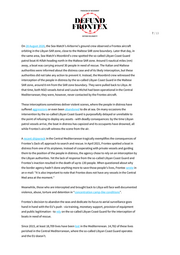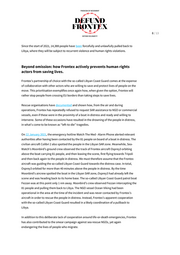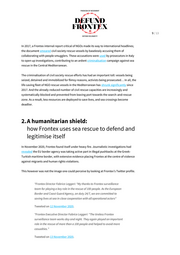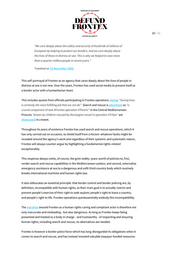Frontex abschaffen und ein europäisches Such- und Rettungsprogramm aufbauen
Die EU-Grenzschutzagentur Frontex hat lange Zeit behauptet, dass Such- und Rettungsmaßnahmen ein wesentlicher Bestandteil ihrer Operationen auf See sind. Neue Recherchen zeigen, wie Frontex daran gearbeitet hat, ihre Rettungskapazitäten nutzlos zu machen - und das auf Kosten von Menschenleben.
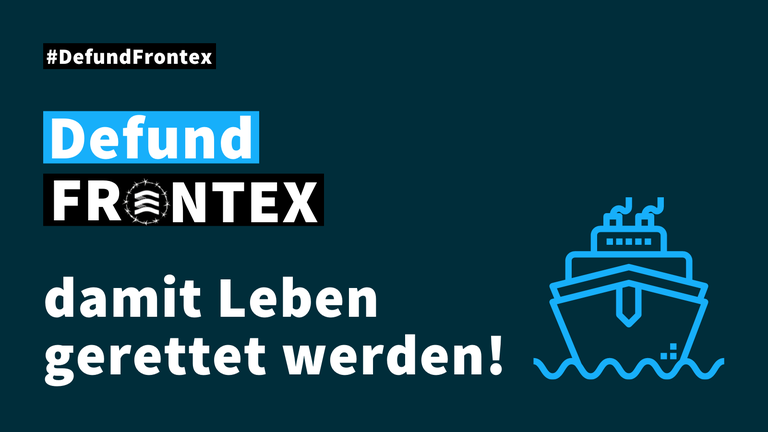
Sea-Watch e.V.
Die europäischen Staaten sind nach internationalem Seerecht dazu verpflichtet, Menschen in Seenot zu retten. Seit vielen Jahren fordern die Zivilgesellschaft, internationale Organisationen sowie einzelne Bürger:innen, dass die EU dieser Verpflichtung nachkommen solle und die notwendigen Ressourcen aufbringen solle, um Menschen vor dem Ertrinken zu bewahren.
Doch diese Forderungen stoßen bei der EU und ihren Mitgliedstaaten stets auf wenig Beachtung. Stattdessen fokussieren sie sich auf den Ausbau der Grenzüberwachung.
Eine gemeinsame Recherche von FragDenStaat und der Seenotrettungsorganisation Sea-Watch zeigt, wie die Entscheidung, nicht die notwendigen Ressourcen zur Rettung von Menschenleben auf See einzusetzen, den Tod von Tausenden zur Folge hatte. Und wie die Grenzpolitik der EU durch den Ausbau von Frontex sowie durch Partnerschaften mit Drittstaaten, die Lebensgefahr für Flüchtende auf der Mittelmeerroute nur erhöht hat.
Die Rolle der EU-Grenzschutzagentur Frontex ist für diese tödliche politische Dynamik von zentraler Bedeutung. Während die Grenzpolizei behauptet, dass Suchen und Retten eine "entscheidende Komponente" ihrer Missionen auf See sind, ist die Realität eine andere: Frontex hat im Laufe der Jahre daran gearbeitet, ihre eigenen Such- und Rettungskapazitäten obsolet zu machen.
Ein signifikantes Beispiel dafür ist die Tatsache, dass die Agentur auf Luftüberwachung setzt anstatt auf die Präsenz von Schiffen auf See. Seit 2015 hat Frontex 100 Millionen Euro in den Ausbau von Luftüberwachung investiert – 0 Euro gingen in maritime Ressourcen.
Die Präsenz von Frontex in der Luft statt auf See bedeutet, dass die Agentur von ihren Flugzeugen aus Boote in Seenot zwar erkennen kann, jedoch nicht in der Lage ist, Schiffe zur Durchführung einer Rettungsaktion zu entsenden. Die Folgen sind, wie nicht anders zu erwarten, tödlich.
Grenzen vor Leben
In den letzten 15 Jahren hat die EU viel in den Auf- und Ausbau ihres Grenzschutzgiganten Frontex gesteckt. Mit einem Budget von 5,6 Milliarden Euro ist sie derzeit die größte Agentur der EU. Zeitgleich wurde das Mittelmeer zur tödlichsten Migrationsroute der Welt – und sie ist es immer noch.
Diese beiden Ereignisse - das Wachstum von Frontex und eine ständig steigende Zahl von Todesfällen auf See - müssen gemeinsam betrachtet werden: Es ist eine politische Entscheidung, die von der EU und ihren Mitgliedstaaten getroffen und sorgfältig geplant wurde, um Außengrenzen anstatt Leben zu schützen.
Im Jahr 2016 erklärte die EU, dass ihre Verpflichtung zur Rettung von Menschen von den Grenzschutzbehörden auf See, insbesondere von Frontex, erfüllt werden würde. Die EU-Grenzschutzagentur könne mit dieser Aufgabe betraut werden, argumentierte die Europäische Kommission.
Seit 2015 sind jedoch mehr als 18.709 Menschen im Mittelmeer ertrunken, was ein tragischer Beweis dafür ist, dass die Grenzpolizei mit der Suche und Rettung von Menschen in Seenot unvereinbar ist. Es ist längst überfällig, dass sich die EU dieser Realität stellt. Es müssen dringend wirksame Maßnahmen ergriffen werden, um weitere Verluste von Menschenleben auf See zu verhindern.
Defund und Divest: für ein europäisches Such- und Rettungsprogramm
Wir schließen uns heute der Forderung an, die Grenzpolizei Frontex abzuschaffen und deren wertvollen Ressourcen in ein lebensrettendes Such- und Rettungsprogramm für das Mittelmeer umzuleiten.
Nur wenn wir die Strukturen abbauen, die Gewalt und Tod auf See verursacht haben und weiterhin verursachen, können wir damit beginnen, Sicherheit für alle zu schaffen. Wir müssen neue Systeme und Strukturen aufbauen, die Menschen in Seenot schützen.
Das Grundrecht auf Leben ist nicht verhandelbar. Das gilt auch für die Schaffung eines europäischen Such- und Rettungsprogramms. Eine Einrichtung mit einer einzigen Aufgabe: die Sicherheit auf See zu gewährleisten und das Leben derjenigen zu schützen, die sich in Gefahr befinden; eine Einrichtung, die von der Öffentlichkeit geleitet wird und ausschließlich von nicht-militärischen Akteur:innen betrieben wird.
Unsere Recherche zeigt, dass die Schaffung eines solchen Programms nur ein Drittel des Budgets erfordern würde, das die EU derzeit für die Missionen von Frontex bereitstellt.
Es muss eine politische Entscheidung getroffen werden, um Leben auf See zu schützen. Frontex will keine Sicherheit garantieren – ihre finanziellen wie materiellen Ressourcen könnten dies jedoch.
1 / 13 Defund Frontex, Build a European Search and Rescue programme Over 18,709 people have drowned in the Mediterranean Sea since 2015. Their fundamental right to life was denied to them by the EU and its Member States, whose conscious, deliberate and carefully planned policies continue to condemn innocent lives at sea to date. Every one of these deaths is a direct consequence of Europe’s ever-growing obsession with borders; a mindset deeply rooted in the continent’s racist and colonialist worldview, crystallised into a rampant anti-migration political agenda. Key to the enforcement and advancement of this border-centric, life-depriving agenda lies the European Border and Coast Guard Agency (Frontex). Frontex is currently the EU’s most powerful agency, with a € 5.6 billion budget and its own army of 10,000 border guards due by 2027. The neglectful growth and expansion of the EU border agency took place during the period in which the Mediterranean Sea became the world’s deadliest migration route. These events, which don’t merely coincide in time but are in fact closely intertwined, reveal a political choice being made as to where the EU’s priorities – and the valuable resources that come within – lie. By choosing not to deploy the necessary resources to save lives at sea, the EU’s deliberate inaction has caused the death of thousands of people at sea. By relentlessly reinforcing its border policing, and by externalising further border control by the means of dangerous partnerships, the EU’s calculated action has condemned thousands of innocent lives. Meanwhile, Frontex has not only become the central actor in implementing the EU’s wish to prevent people from seeking safety in Europe; the EU border force has also used its expanded powers to pursue an agenda of its own, which further endangers the lives of people on the move. The time is long-overdue to reverse this course. We must dismantle the structures that have caused – and continue to cause – violence and death at sea. In their place, we must build new systems and structures that create safety for all.

2 / 13 1. Policing comes first: Why border policing is incompatible with the obligation to save lives at sea All European Member States have the obligation, according to international maritime and human rights law, to save lives at sea and disembark those that have been rescued in a place of safety. Yet, historically, the States - and the EU - have neglected taking the necessary steps to comply with their duty. Instead, the EU has chosen to rely on law enforcement actors operating in the Mediterranean Sea, and in particular on the European Border and Coast Guard Agency (Frontex), to carry out search and rescue operations. This has traditionally presented Frontex with a two-faced, incompatible set of duties: on the one hand, Frontex’s political mandate is to prevent people who migrate from crossing the EU’s external borders. At the same time, like any other stakeholder present at sea, Frontex deployments at sea have the obligation under international law (article 98 of the United Nations Convention on the Law of the Sea; and regulation 33(1), chapter V of the SOLAS Convention, as amended in 2004) to rescue people from situations in distress, and help them reach a place of safety (3.1.9, annex of the SAR Convention as amended in 2004), namely on European soil. These requirements are also enshrined and referred to in article 9(1) regulation (EU) N° 656/2014 of 15 May 2014. Presented with this contradiction - to follow Europe’s anti-migration agenda and, at the same time, to comply with the duty to render assistance - Frontex, first and foremost a law enforcement agency, has made its choice: border policing prevails over saving lives. Over the years, Frontex’s disregard of the obligation to save lives has become blatant and widely documented, especially in the Central Mediterranean Sea, one of the world’s deadliest migration routes. Through three key policies and decisions, Frontex has sidelined the obligation of its deployments to conduct search and rescue in order to prioritise border control. By doing so, it has condemned thousands of innocent lives at sea.

3 / 13 Air surveillance exclusively: an engineered gateway for avoiding assistance at sea Frontex operations traditionally rely on assets (air, sea and land) contributed at Frontex’s request by European countries, EU and non-EU. In 2011, Frontex was given the power to lease and charter assets from private companies for its own operations, the main objective being that Frontex would be able to cover any gaps left by insufficient asset contributions by EU countries, which could potentially lead to unwanted crossings of European borders. This power was renewed in 2016 with the first big expansion of Frontex; in 2019, Frontex’s powers were further expanded, granting the agency the capability of not only leasing, but also acquiring its own assets. Frontex is now foreseen to be able to create and operate its own fleet by 2027, independent from European countries’ contributions. How Frontex has chosen to date to use this power and invest its resources exemplifies well how, given the opportunity, Frontex prioritises border patrolling while disregarding the legal duty to save lives. Air assets such as planes, helicopters or drones, and maritime assets such as vessels and boats, are meant to work in coordination during search and rescue operations in order to save lives. Air assets monitor the sea and locate boats in distress much more easily than vessels. Upon the sighting of people in distress, air assets can alert maritime assets, which can then sail towards the emergency site, rescue people, provide medical attention if needed, and bring them to a place of safety. Yet through years-worth of policy decisions, Frontex has actively deprived its operations from maritime assets which, if deployed, would inevitably trigger Frontex deployments’ obligation to rescue lives at sea. Instead, Frontex has heavily prioritised its aerial fleet, which allows it to conduct surveillance and border control tasks, yet de facto renders the agency unable to rescue people in distress. This transition into aerial predominance was conceived and executed at a time where Frontex was well aware that the maritime resources European countries were willing to contribute to the border agency’s operations were highly insufficient - both in number of assets needed and in duration of deployment. Year after year, the gaps between the assets Frontex says are necessary and what European countries decide to contribute has consistently been wider for maritime assets than for aircrafts. In 2016, European countries only agreed to contribute 48% of the offshore vessels Frontex had requested; for that year, countries did cover 100% of Frontex’s aircraft needs.

4 / 13 In 2017, countries only met 73% of vessel needs, but 100% of aircraft needs; with comparable numbers for 2018 (71% and 100% respectively). In 2019, countries contributed only 11% of necessary vessels, but 37% of aircrafts requested by Frontex. These gaps were meant to be addressed via Frontex’s power to lease its own assets. Logic would dictate that, in view of the severe and persistent shortage of maritime assets, Frontex would seek to lease and charter vessels first and foremost. Notwithstanding, Frontex has taken the opposite approach. Since 2015, Frontex has invested € 100 million in leasing and acquiring air assets to be deployed in its operations. This includes multiple aircrafts, aerostats such as zeppelins, and surveillance drones. During this period, however, European countries were already contributing 100% of Frontex’s aircraft needs, with the single exception of 2019. For the exact same period, Frontex has invested a total of € 0 in leasing or acquiring maritime assets. This is in spite of the fact that countries’ maritime contributions consistently and largely failed to meet Frontex’s own requirements, with vessel shortages of up to 89%. During this period, at least 2,870 people died in the Mediterranean per year on average. The difference between the type of asset Frontex chose to reinforce (aerial) and the one that it chose to disregard (maritime) is that, while both types of assets allow Frontex to carry out border control tasks, only the latter bounds the agency to rescuing people in distress at sea. In fact, while Frontex has been extremely diligent in investing millions of euros in incorporating aircrafts and other air assets to its own fleet, the EU border agency has consistently dragged its feet when it comes to procuring itself with maritime equipment. In 2015, Frontex decided to invest € 7.8 million in 2-year contracts with private companies for the leasing of aircraft for its operations. The largest part of this budget (€ 7.4 million) was dedicated to aircrafts to be operated at sea. In 2017, Frontex’s aircraft contracts were renewed with an extended financial ceiling, now mounting to € 14.5 million. During this period, no contracts or leasing procedures were issued or arranged for maritime assets. Frontex did, however, find time and resources to engage in creative approaches to border control via aerial surveillance. In 2017, Frontex announced its intention to trial the use of zeppelins at the EU’s borders. To date, the agency has invested € 3.4 million euros in two of these experiments: one in 2019, and a second one in 2021.

5 / 13 In 2017, Frontex put its equipment leasing strategy into paper. The document confirms Frontex’s intention to heavily prioritise the use of air assets in its operations, and the agency’s disregard for maritime assets. The 2017 Frontex Strategy for Acquisition of Technical Equipment outlines ongoing and future plans to lease and acquire more air assets, as well as other equipment such as patrol cars and mobile surveillance systems. When it came to maritime assets such as vessels and boats, the document merely states: “Frontex is exploring the feasibility of leasing OPVs with full technical crew on the market. (...) This internal study aims at bringing clarity to if this approach is realistically possible, the baseline requirements to be applied, what the market can offer in terms of (technical) crew and financial implications. The study will continue during the autumn of 2017 and following the results an assessment will be made on the plausibility of deploying a leased OPV in a Frontex-led operation.” One year later, at the end of 2018, Frontex seemed to be stuck in its exploratory phase, merely communicating that it would: “run a Pilot Project in order to test the concept of leasing/chartering maritime patrol vessels in order to cover potential gaps in one or more operations.” By 2019, and while progress on the procurement of maritime assets seemed to have stalled, a new round of leasing contracts for aerial surveillance was in order; this time, with a substantial budget increase mounting up to € 27 million, out of which € 25.5 million was intended for aircrafts deployed in sea operations. That same year, Frontex also published a contract notice for the acquisition of the agency’s first surveillance drones. A 2-year contract was awarded in 2020, for € 50 million. Meanwhile, Frontex’s vessels remain nowhere to be seen. In 2019, Frontex reported that it would develop “a strategic operational concept with the support of experts from Member States and external experts” with the view of acquiring “a Coastal Patrol Vessel(s) with technical crew.”

6 / 13 In February 2020, the agency published a notice convening a meeting with industry representatives: “Frontex is organising a maritime informative event to gain comprehensive information on products and services available on the market regarding coastal patrol vessels (CPV), in order to perform maritime technical equipment services. More specifically, Frontex intends to charter 1 CPV to be deployed in the Mediterranean (Greece) in 2021 for up to 2 years, as a pilot project.” No further information or conclusions have been made public with regards to the course of this meeting. The February 2020 invitation indicated a contract notice for the chartering of vessels was expected to be published on 30 September 2020. However, no contract notices have been issued by Frontex regarding the acquisition of vessels at the time of writing (August 2021). During the period in which Frontex pivoted towards a predominance of aerial surveillance, the mortality rate in the Central Mediterranean doubled on a yearly basis. By 2019, the known rate of deaths per departure reached a new high: one out of 21 people died while attempting the crossing. (In)action from the air: people left to die or pulled back into torture Frontex’s shift from the sea to the air entails a shift from potential assistance to surveil- lance, thus enabling the agency to fulfil its mission of preventing migration to Europe. From the air, Frontex-deployed aircrafts carry out aerial surveillance, gathering footage and collecting information that it then uses for internal purposes or transmits to third parties. A lack of sufficient maritime assets deployed at sea means that, when a Frontex aircraft comes across a boat in distress in need of rescue, the border agency needs to rely on third parties to conduct a SAR operation. Frontex’s decision on who it relies on triggers violations of human rights and further puts lives in danger. Rescue organisations present at sea have denounced multiple times how, upon witnessing a boat in distress, Frontex will alert the relevant authorities: the Italian and Maltese Rescue Coordination Centres, but also - and in fact, mainly - the Libyan Joint Rescue Coordination Centre (JRCC). This is in spite of the fact that the so-called Libyan Coast Guard, when dispatched to intercept a boat in distress, will unlawfully pull those people back into Libya. Various documented cases also show how Frontex will even withhold information from civil vessels in the vicinity of a distress case in order to favouring rescue operations carried out by the so-called Libyan Coast Guard.

7 / 13 On 28 August 2020, the Sea-Watch’s Airborne’s ground crew observed a Frontex aircraft orbiting in the Libyan SAR zone, close to the Maltese SAR zone boundary. Later that day, in the same area, Sea-Watch’s Moonbird’s crew spotted the so-called Libyan Coast Guard patrol boat Al-Kifah heading north in the Maltese SAR zone. Around 5 nautical miles (nm) away, a boat was carrying around 30 people in need of rescue. The Italian and Maltese authorities were informed about the distress case and of its likely interception, but these authorities did not take any action to prevent it. Instead, the Moonbird crew witnessed the interception of the people in distress by the so-called Libyan Coast Guard in the Maltese SAR zone, around 8 nm from the SAR zone boundary. They were pulled back to Libya. At that time, both NGO vessels Astral and Louise Michel had been operational in the Central Mediterranean; they were, however, never contacted by the Frontex aircraft. These interceptions sometimes deliver violent scenes, where the people in distress have suffered aggressions or even been abandoned to die at sea. On many occasions the intervention by the so-called Libyan Coast Guard is purposefully delayed or unreliable to the point of refusing to deploy any assets - with deadly consequences: by the time Libyan patrol vessels arrive, the boat in distress has capsized and its occupants have drowned, all while Frontex’s aircraft witness the scene from the air. A recent shipwreck in the Central Mediterranean tragically exemplifies the consequences of Frontex’s (lack of) approach to search and rescue. In April 2021, Frontex spotted a boat in distress from one of its airplanes. Instead of cooperating with private vessels and guiding them to the position of the people in distress, the agency chose to rely on an interception by the Libyan authorities. Yet the lack of response from the so-called Libyan Coast Guard and Frontex’s inaction resulted in the death of up to 130 people. When questioned about why the border agency hadn’t done anything more to save those people’s lives, Frontex wrote in an e-mail: “It is also important to note that Frontex does not have any vessels in the Central Med area at the moment.” Meanwhile, those who are intercepted and brought back to Libya will face well documented violence, abuse, torture and detention in “concentration camp-like conditions”. Frontex’s decision to abandon the seas and dedicate its focus to aerial surveillance goes hand in hand with the EU’s push - via training, monetary support, provision of equipment and public legitimation - to rely on the so-called Libyan Coast Guard for the interception of boats in need of rescue. Since 2015, at least 18,709 lives have been lost in the Mediterrenean. 14,782 of these lives perished in the Central Mediterranean, where the so-called Libyan Coast Guard operates and the EU doesn’t.

8 / 13 Since the start of 2021, 14,388 people have been forcefully and unlawfully pulled back to Libya, where they will be subject to recurrent violence and human rights violations. Beyond omission: how Frontex actively prevents human rights actors from saving lives. Frontex’s partnership of choice with the so-called Libyan Coast Guard comes at the expense of collaboration with other actors who are willing to save and protect lives of people on the move. This prioritisation exemplifies once again how, when given the option, Frontex will rather stop people from crossing EU borders than taking steps to save lives. Rescue organisations have documented and shown how, from the air and during operations, Frontex has repeatedly refused to request SAR assistance to NGO or commercial vessels, even if these were in the proximity of a boat in distress and ready and willing to intervene. Some of these occasions have resulted in the drowning of the people in distress, in what’s come to be known as “left-to-die” tragedies. On 22 January 2021, the emergency hotline Watch The Med - Alarm Phone alerted relevant authorities after having been contacted by the 81 people on board of a boat in distress. The civilian aircraft Colibri 2 also spotted the people in the Libyan SAR zone. Meanwhile, Sea- Watch’s Moonbird’s ground crew observed the track of Frontex aircraft Osprey3 orbiting above the boat carrying 81 people, and then leaving the scene, first flying towards Tripoli and then back again to the people in distress. We must therefore assume that the Frontex aircraft was guiding the so-called Libyan Coast Guard towards the distress case. In total, Osprey3 orbited for more than 40 minutes above the people in distress. By the time Moonbird’s aircrew spotted the boat in the Libyan SAR zone, Osprey3 had already left the scene and was heading back to its home base. The so-called Libyan Coast Guard patrol boat Fezzan was at this point only 1 nm away. Moonbird’s crew observed Fezzan intercepting the 81 people and pulling them back to Libya. The NGO vessel Ocean Viking had been operational in the area at the time of the incident and was never contacted by Frontex’s aircraft in order to rescue the people in distress. Instead, Frontex’s apparent cooperation with the so-called Libyan Coast Guard resulted in a likely coordination of a pullback to Libya. In addition to this deliberate lack of cooperation around life-or-death emergencies, Frontex has also contributed to the smear campaign against sea rescue NGOs, yet again endangering the lives of people who migrate.
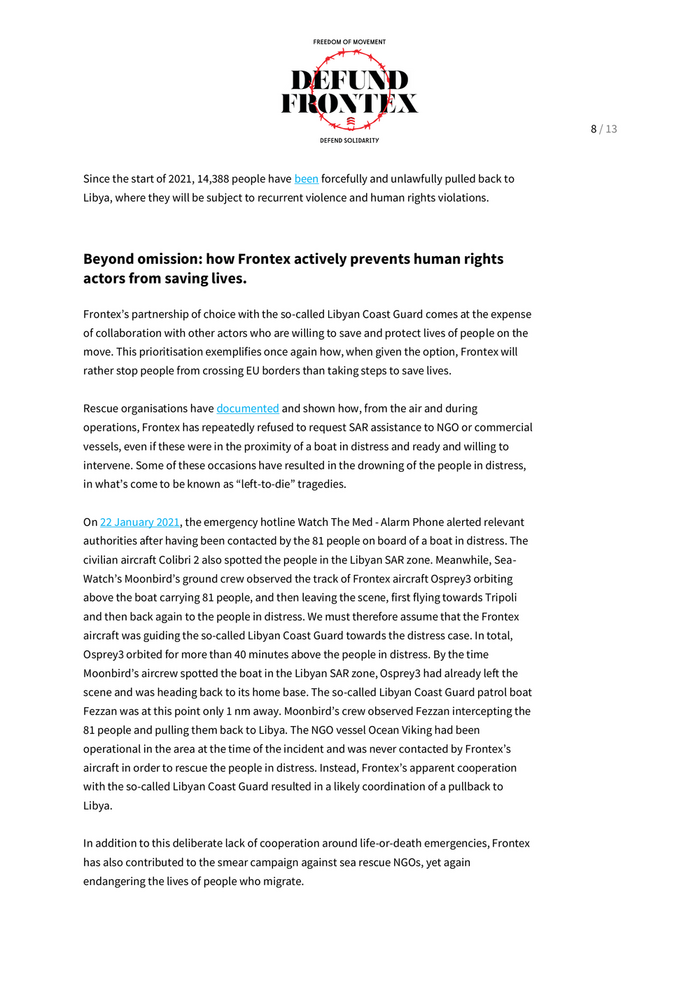
9 / 13 In 2017, a Frontex internal report critical of NGOs made its way to international headlines; the document smeared civil society rescue vessels by baselessly accusing them of collaborating with people smugglers. These accusations were used by prosecutors in Italy to open up investigations, contributing to an ardent criminalisation campaign against sea rescue in the Central Mediterranean. The criminalisation of civil society rescue efforts has had an important toll: vessels being seized, detained and immobilized for flimsy reasons, activists being prosecuted… In all, the life-saving fleet of NGO rescue vessels in the Mediterranean has shrunk significantly since 2017. And the already-reduced number of civil rescue capacities are increasingly and systematically blocked and prevented from leaving port towards the search-and-rescue zone. As a result, less resources are deployed to save lives, and sea crossings become deadlier. 2. A humanitarian shield: how Frontex uses sea rescue to defend and legitimise itself In November 2020, Frontex found itself under heavy fire. Journalistic investigations had revealed the EU border agency was taking active part in illegal pushbacks at the Greek- Turkish maritime border, with extensive evidence placing Frontex at the centre of violence against migrants and human rights violations. This however was not the image one could perceive by looking at Frontex’s Twitter profile. “Frontex Director Fabrice Leggeri: "My thanks to Frontex surveillance team for playing a key role in the rescue of 100 people. As the European Border and Coast Guard Agency, on duty 24/7, we are committed to saving lives at sea in close cooperation with all operational actors“ Tweeted on 12 November 2020. “Frontex Executive Director Fabrice Leggeri: “The tireless Frontex surveillance team works day and night. They again played an important role in the rescue of more than a 100 people and helped to avoid more casualties.” Tweeted on 13 November 2020.
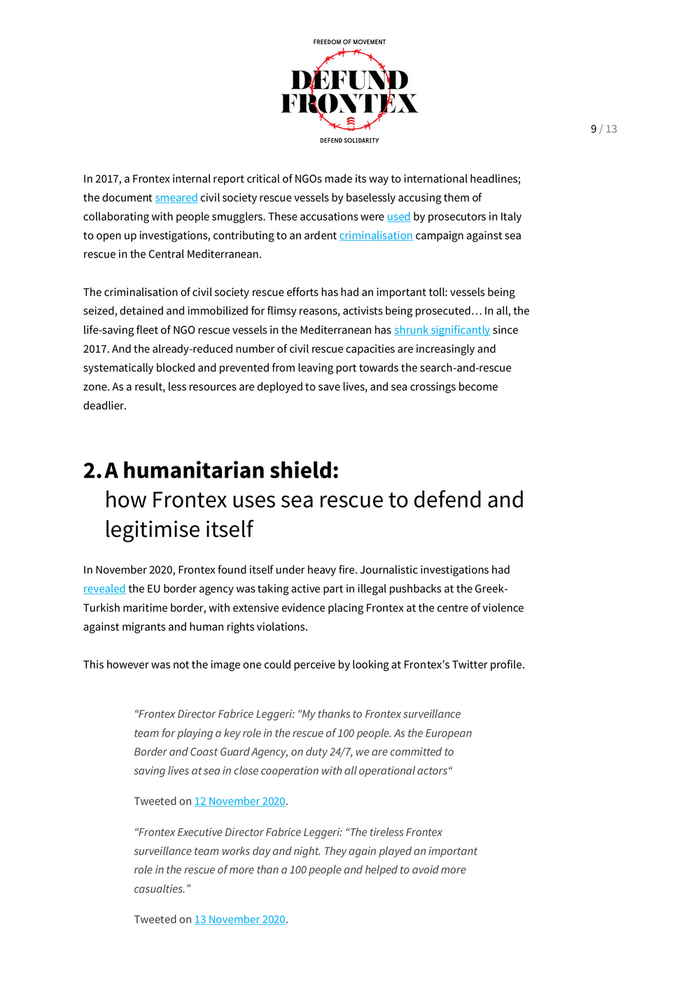
10 / 13 “We care deeply about the safety and security of hundreds of millions of European by helping to protect our borders. And we care deeply about the lives of those in distress at sea. This is why we helped to save more than a quarter million people in recent years.” Tweeted on 14 November 2020. This self-portrayal of Frontex as an agency that cares deeply about the lives of people in distress at sea is not new. Over the years, Frontex has used social media to present itself as a border actor with a humanitarian heart. This includes quotes from officials participating in Frontex operations saying: “Saving lives is certainly the most fulfilling job that we can do”. Search and rescue is advertised as “a crucial component of new #Frontex operation #Themis” in the Central Mediterranean. Pictures “drawn by children rescued by Norwegian vessel in operation #Triton” are showcased in a tweet. Throughout its years of existence Frontex has used search and rescue operations, which it has only carried out on occasion, to shield itself from criticism: whatever faults might be revealed around the agency’s work and regardless of their systemic and systematic nature, Frontex will always counter-argue by highlighting a fundamental rights-related exceptionality. This response always omits, of course, the grim reality: years-worth of policies to, first, render search and rescue capabilities in the Mediterranean useless; and second, externalise emergency assistance at sea to a dangerous and unfit third-country body which routinely breaks international maritime and human rights law. It also obfuscates an essential principle: that border control and border policing are, by definition, incompatible with human rights, as their main goal is to actually restrict and prevent people’s exercise of their right to seek asylum; people’s right to leave a country; and people’s right to life. Frontex operations quintessentially embody this incompatibility. The narrative around Frontex as a human rights-caring and compliant actor is therefore not only inaccurate and misleading - but also dangerous. As long as Frontex keeps being presented and treated as a body in charge - and trustworthy - of respecting and ensuring human rights, including search and rescue, no alternatives are needed. Frontex is however a border police force which has long-disregarded its obligations when it comes to search and rescue, and has instead invested valuable taxpayer-funded resources
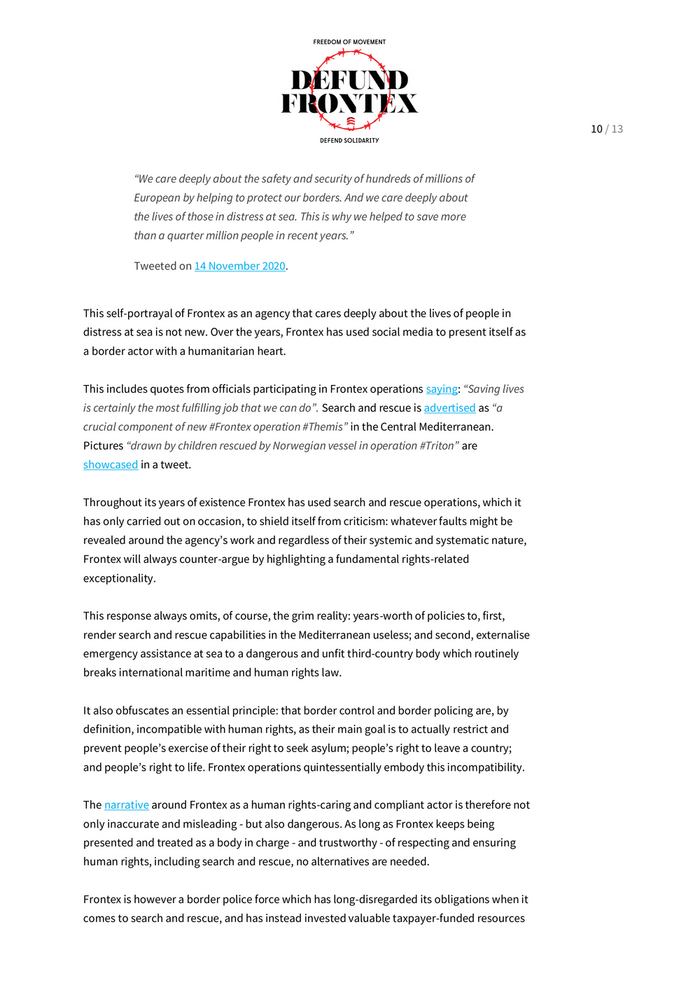
Dieser Artikel ist in anderen Sprachen verfügbar.







